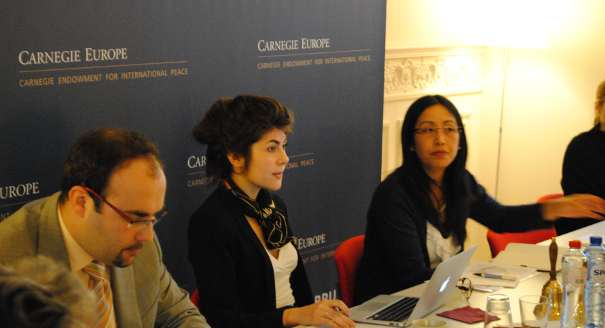Registration
Thank you!
You will receive an email confirming your registration.
IMGXYZ3691IMGZYXAfter years of instability and marginalization, Iraq is now emerging with ambitions to become a key regional player. This ambition is signaled by its hosting of the Arab League summit in March, an extraordinary development that ended more than two decades of Iraqi isolation from the rest of the Arab world. Carnegie Middle East Center visiting scholar Maria Fantappie discussed Iraq’s emerging role vis-à-vis the Syrian crisis and changing regional alliances in the Middle East at a roundtable event hosted by Carnegie Europe. Carnegie Europe’s deputy director Lizza Bomassi moderated.
Iraq’s Emerging Role
- An Ambitious Foreign Policy Agenda: After nearly two decades of isolation and amid an ongoing domestic struggle in Iraq, the country is beginning to develop its own foreign policy agenda with the ambition to emerge as a key player in the region, argued Fantappie.
- Partnership: She suggested that Iraq’s foreign policy project is founded on a partnership between Prime Minister Nouri Maliki and the Kurds who have found common ground in their regional aspirations.
The ‘Go-To’ State
- The Regional Arena: The Iraqi leadership aspires to promote a positive image of the country and to re-enter the regional and international arenas, Fantappie contended. Iraq’s ambition is to build a multilateral web of alliances and promote itself as ‘go-to’ state for resolving regional and international tensions.
- Autonomy: The country seeks to gain autonomy from its neighbors and establish itself as the director of its own foreign policy agenda, she added.
Bridging the Foreign Policy Gap
- Despite Domestic Tensions: Fantappie argued that despite the gap between Iraq’s foreign policy ambitions and the current reality, there are several factors that support the emergence of Iraq as a mediator in the region. For example, she said, Maliki and the Kurds have so far shown a willingness to prioritize their foreign policy aspirations over domestic tensions.
- Syria: Most importantly, Fantappie argued, Iraq’s ambition to have a role in the evolution of the Syrian crisis encourages it to assert itself as a mediator in the ongoing crisis. This would be the first step for its foreign policy aspirations to become a reality.
Domestic Tensions
Fantappie listed some of the challenges that face Iraq’s ambitious foreign policy agenda.
- Neighbors: Iraq’s neighbors might play to the ongoing domestic tensions between Maliki and Iraqya to undermine the country’s emergence in the region.
- Maintaining the Partnership: The success of Iraq’s foreign policy project relies on the endurance of the partnership between Maliki and the Kurds. Fantappie argued that while tensions between the two parties remain high within Iraq, their partnership in foreign policy might help them find a power-sharing formula on Iraq’s domestic scene.
